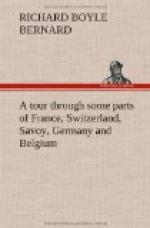opulence. The town-house is considered as a model
of Gothic architecture, and the cathedral of St. Peter
is a stately building. The portal of the Collegium
Falconis presents a specimen of Grecian architecture,
which is much admired for the simplicity. The
University of Louvain was formerly of great
celebrity, and no person could exercise any public
authority in the Austrian Netherlands, without having
graduated here. This regulation, however beneficially
intended, only produced the effect of raising extremely
the expence of the different diplomas, without being
attended with any advantage, except to the funds of
the university. In the present unsettled state
of the Netherlands, it cannot be expected that
the seats of learning should be as much frequented,
as they probably will be when their new sovereign
shall have had leisure to turn his attention to the
important subject of public education; and the
wisdom of the regulations he has promulgated, on other
matters of general interest (particularly that which
enforces the more solemn observation of Sunday) leaves
little room to doubt that this point will, in its
turn, be duly and successfully attended to. Those
who have resided at Louvain have observed, that its
inhabitants are in general more polite than
in most of the towns in these provinces; but my stay
was not sufficiently long to enable me to form any
opinion on the subject. The manners of the people
do not seem to me very dissimilar from those of the
French, but others think they most resemble the Dutch.
In fact, the Netherlanders have no very peculiar
characteristics, but partake, in many respects,
of those which distinguish the various nations from
whom they are descended. They have been much and
often abused by various writers, who have attributed
to them the faults of almost all the nations
of Europe, without allowing that they possess any
of the good qualities by which those faults are palliated
in the other nations. Those, however, who are
of a candid disposition will not feel inclined to
assent to the truth of statements so evidently dictated
by enmity or spleen. But whilst I would not have
the Flemish considered as a compound of all that is
exceptionable in the human character, I do not consider
them as meriting any particular praise; nor
can I vindicate them from the charge of dishonesty,
which has been so often alleged against them.
In general on the Continent, where the English
are the subjects of extortion, the fraud is
considered as trivial, and the French often boast
in conversation how John Bull is pillaged at Paris.
But whatever may be the Flemish character, it
is allowed by all that they follow the French customs
in their domestic arrangement, but are in general
more cleanly. Their kitchens are kept very
neat, and the cooking apparatus is ranged in order
round the stove, which, in many of the kitchens that
I saw in the small inns, projects considerably into
the room.




